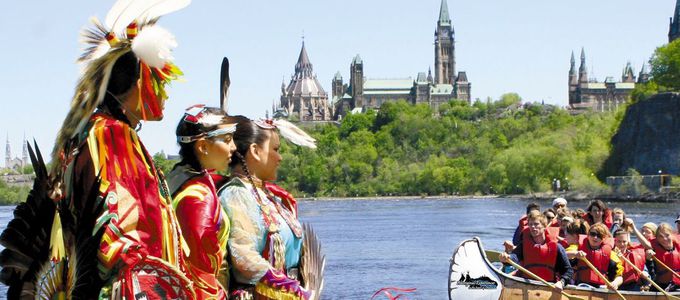
There is a good chance that the seeds for the mustard we spread on our hot dogs come from the province of Saskatchewan. On 12 March 2017 the international leader of the New Apostolic Church will visit this Canadian Prairie province.
Saskatchewan: it sounds like adventure and incomparable natural beauty. Magnificent landscapes, forests, and roughly a hundred thousand lakes, whose photographs one can admire in brochures and calendars. This is Canada at its best.
Then there is still the province’s immense size. This province alone is as big as France and Switzerland put together. Here, in the middle of Canada, is the country’s bread basket. Saskatchewan is one of the Prairie Provinces. Wheat fields stretch as far as the eye can see and beyond. Saskatchewan is also home to the Cree people, an indigenous people. The first Europeans began to settle in the region at the beginning of the eighteenth century. The building of the railway, the Canadian Pacific Railway, started in 1880. It is therefore not surprising that Saskatchewan has only formally existed as a province since 1905. Its capital is Regina. It was here, in 1954, that the first New Apostolic congregation was established in this part of the country.
The name “Saskatchewan” comes from a Cree word meaning “swiftly flowing river”. Despite its enormous size of 650,000 square kilometres the province is nearly as sparsely populated as Tibet—statistically with 1.6 people per square kilometre. More than 13 per cent of the population are indigenous Canadians. They have their own university in Regina, the First Nations University of Canada. Saskatoon is the largest city in the province with a population of more than 200,000 people, and is the provinces’ transportation hub. Here, in the middle of the Prairies, you find everything you expect from a city, including an airport. On 12 March 2017, Chief Apostle Jean-Luc Schneider will celebrate a divine service in a hotel in the city, the Saskatoon Inn, which will be transmitted to 81 locations across Canada—making Saskatoon the centre of the country in a figurative sense as well.
Happy 150th birthday, Canada!
The president of the international Church will use the opportunity to meet with representatives of Aboriginal communities. They will talk about friendship and peace, and have lunch together. Canada is, after all, celebrating its sesquicentennial this year! And peace has always been a precious commodity in this country with its multicultural heritage. The Apostle ministry is the ministry of reconciliation, and Chief Apostle Schneider wants to reach out and set an accent and contribute to the country’s 150th anniversary. District Apostle Mark Woll and District Apostle Helper Frank Dzur—who is the responsible Apostle for the province of Saskatchewan—will also be at the meeting.
Where Canada’s francophone heart beats
From Saskatoon, the Chief Apostle will travel on to the province of Québec, where Canada’s French heart beats. The word “Kebec” is an Algonquin word meaning “where the river narrows”. Thirty-nine indigenous nations live here, especially the Iroquois and the Cree. Montreal is the largest city in the province, but not its capital. The capital is Québec City, where the Chief Apostle will celebrate a divine service—something the members are really looking forward to.
The congregation is mostly African. A pioneer of the Church in the province, the retired District Elder Don Jess, says, “Many of our first African members in Québec arrived as New Apostolic members. Most came from the Democratic Republic of Congo (called Zaire in those days). They were drawn to Québec as many were French-speaking and they would not have to deal with learning a new language.” For this reason, one of the Apostles accompanying the Chief Apostle to Canada is Congolese: District Apostle Tshitshi Tshisekedi .




